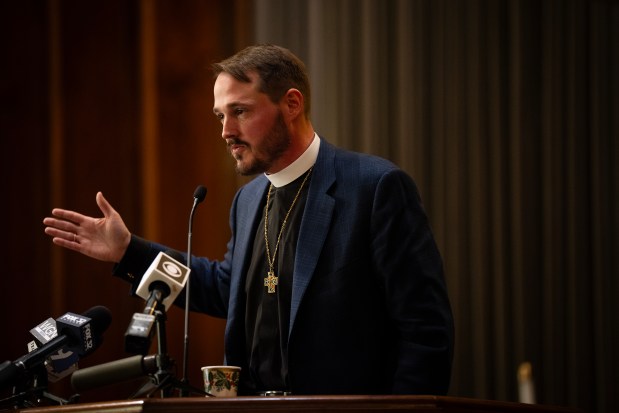The city of Aurora’s new 911 emergency dispatch center, which includes updated technology and a new floor plan, officially opened on Thursday.
Mayor Richard Irvin, Police Chief Keith Cross and Fire Chief Dave McCabe were among the city officials who cut the ribbon on the new center, located within the city’s police department headquarters on East Indian Trail Road.
Officials at the ribbon-cutting ceremony said the $1.4 million center will cut response times and improve communication between public safety departments.
“Our telecommunications staff are the lifeline of our city, and they help keep us all safe. I’m extremely grateful for each and every one of them, and I’m glad that they have this space to work and continue to serve us,” Cross said.
McCabe said that 911 operators are the “glue” that holds the city’s public safety departments together because they share information between all first responders in an emergency.
“A lot of times police and fire get the credit for being the first responders, but our 911 operators truly are the first responders. When people have an emergency, they’re in a time of need, that’s the first person they talk to. A lot of times, that’s what their impression of the whole operation of the city is based on – how those dispatchers treat them,” he said.
Irvin echoed many of McCabe’s statements during his speech, but also brought in his own personal connection to the 911 center.
“Many of you know that my mother was a 911 operator right here in the Aurora Police Department, and I would hear many stories over the years about the things that she would come in contact with and how she would be that first contact to send our police or our fire out to a particular situation,” he said.
Deputy Mayor Guillermo Trujillo, a retired police officer, said he sees a “night and day difference” in how the 911 center looks now compared to how it looked when he first started with the department. He thanked the dispatchers for keeping him alive in his 30 years with the department.
The renovation is a “transformational leap forward in public safety capabilities,” according to Aurora Chief Information Officer Michael Pegues. In addition to simple computer upgrades, he said the center was upgraded with the latest communication equipment and smart technology.
A total of 12 stations each hold between six and eight monitors, which allow the operators to interact with advanced maps, dispatch fire or police, talk on the radio and answer 911 calls.
Separate from the workstations, nearly an entire wall of the center has been dedicated to screens showing cameras, real-time data, news and more.
Not all of the changes to the center were technological leaps forward. The renovation also changed the layout of the center, which 911 Center Supervisor Jacqueline Hobday said will improve communication between operators.
Stations are now positioned in two lines facing the walls with a walkway in the center, allowing any operator to easily look to their left or right to talk to a fellow operator or to turn around and talk to those behind them. Status lights, which indicate when an operator is on a call or busy, were also added to each station.
During an emergency, each operator does a different job, such as dispatching or answering a call about a fire, so the faster they are able to communicate with each other, the faster they are able to respond to situations and potentially save lives, according to Hobday.
The renovated center’s new communication technology also allows 911 operators to better collaborate with the city’s own departments and other more regional partners, she said. For example, the center is able to get real-time intelligence and even video footage during crisis situations through the city’s Critical Incident Intelligence Center.
Construction began on the center in February, which split up the 911 operators across two different locations: a small room in the police headquarters and in the 911 backup center in the fire department headquarters, according to Hobday.
Despite the operators being split up, they managed to do their job seamlessly through phone and radio, she said. Cross also praised the operators for their work during the renovation.
“These individuals had to work under some very difficult circumstances for a very long time, but they continued to provide excellent services to our organization and, more importantly, the people that we serve, our community,” he said.
rsmith@chicagotribune.com



